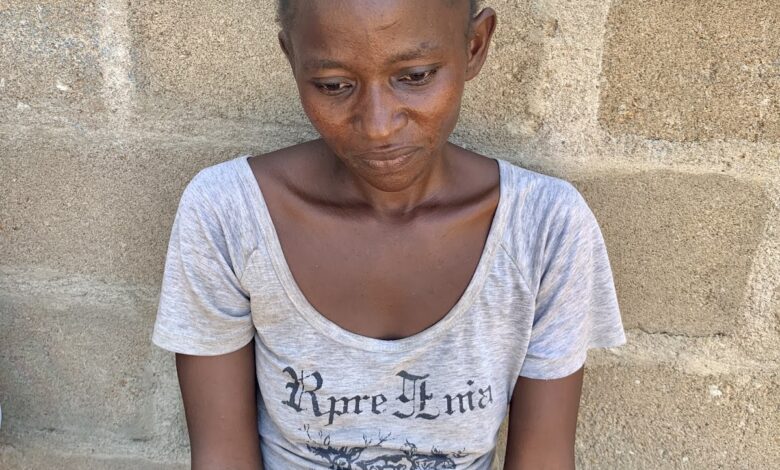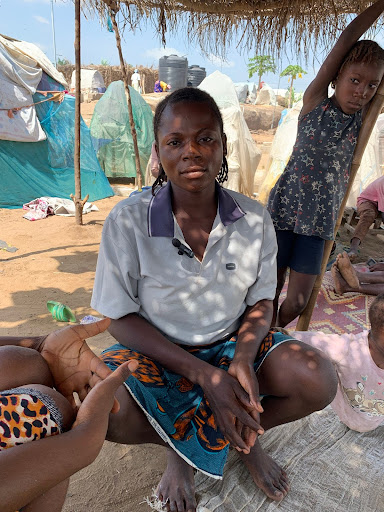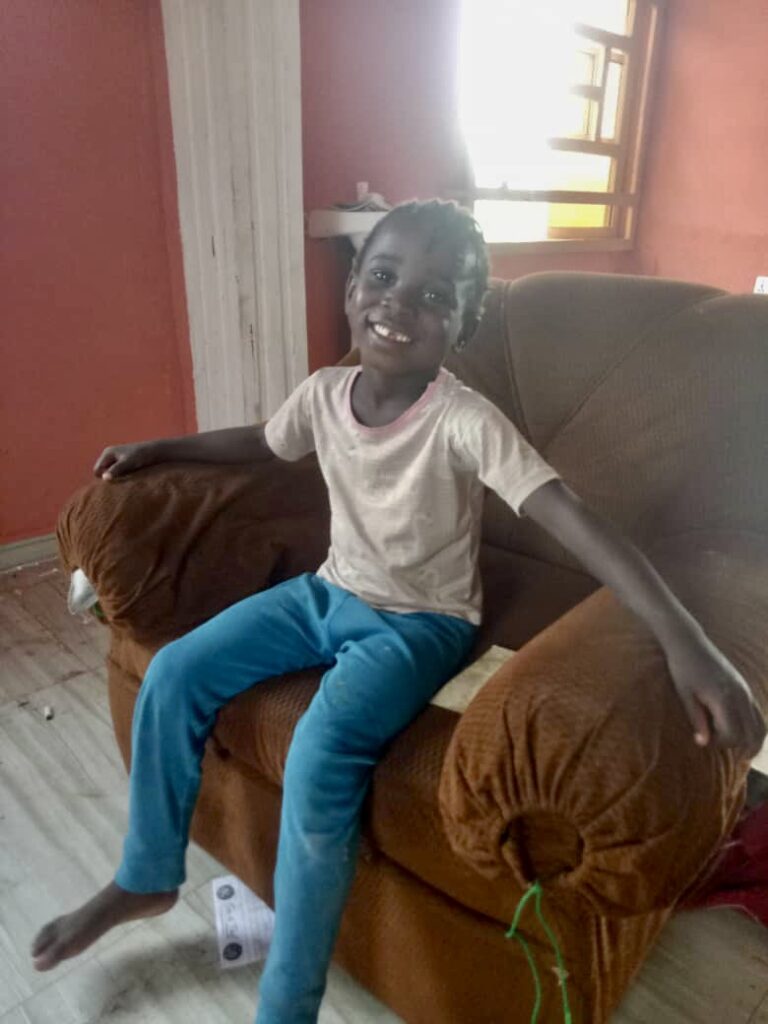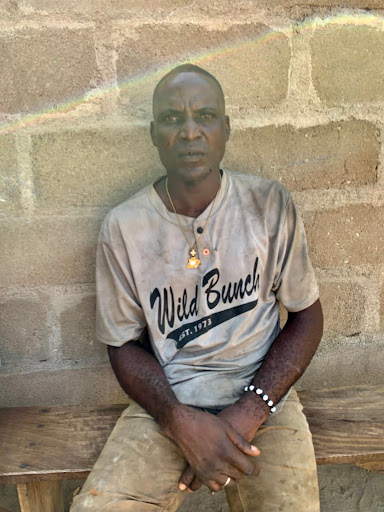Children Go Missing In Benue IDP Camp
After two children went missing within the space of two months at the Tse Yandev camp in Benue State, a parent is directly approached to sell his child for the sum of ₦500,000.

Janet Mfanyi’s little boy was the first child to be taken. Since then, she has been besieged by a combination of sadness and loneliness that no amount of jovial company can remedy.
Even though her husband is alive and well, Mfanyi lives like a widow at the IDP camp, the toddler tugging at her wrapper, the only one of four children remaining with her.
Long before the incident that left her desolate and grief-stricken, she lived in Utyondo, a community located in Guma Local Government Area of Benue State, North-central Nigeria.
“Our community has two sides because there is a stream separating us from the other locals,” Mfanyi said, adding that Utyondo was largely peaceful.
One evening, however, while they sat in their compound, Mfanyi and the others began to hear gunshots from the other side of the stream. Then they saw villagers frantically running towards them.
“When we asked what was happening, they said they had been attacked by some herders and that some people had been killed already,” she said, explaining that they sheltered the fleeing villagers.
The sound of the gunshots intensified and got closer with time, so Mfanyi and some others picked up a few of their belongings and left for a neighbouring settlement to spend the night. That night would turn into many more.
And so, like many people in the Tse Yendev IDP camp located in the state capital, Makurdi, Mfanyi fled the place she called home to live in one among dozens of makeshift tents in the camp, struggling daily to eke out a living with her family. Living conditions in the camp were so hard that she had to send her eldest child to live with one of her relatives as they could not afford the girl’s education.
Mfanyi endured the sharp turn in her fortunes like everyone else; hers would, however, take a turn for the worse four years later on the evening of June 26, 2023. She was inside the tent when she heard a woman telling someone how she had seen a child stolen by an unidentified man.
Earlier that day, some persons who said they were soldiers had come sometime during the day to donate items to the displaced persons. Mfanyi was not in a hurry to go receive the free items being shared, so that meant her children could not go there to receive them either.
“I had always warned my children not to go to such gatherings if I don’t go there,” she said, explaining that they had strayed from her mother when she briefly left to fetch some water but were brought back by the older woman who made them return to the tent.
“She came down to where I was fetching water to notify me that my children had gone to receive biscuits from the visitors, but she had asked them to go back to their tent. She also said she wants to go out to get something, so I should hurry home and look after them myself,” Mfanyi narrated, adding that she immediately did as she was told.
Mfanyi returned to find them lying around the tent with satisfied looks. She proceeded to perform some chores inside the tent when she heard a woman telling people that she saw a man leaving with a naked child. Immediately she heard that, she rushed out to find her children missing. Dazed, she set about the camp to look for them alongside other people who had heard about the strange man.
“While we found the others, one was missing,” she said. They searched down the road outside the camp, but neither the child nor the unknown man was sighted.
Mfanyi’s already distorted mind was thrown into more chaos when the woman who had sounded the child-theft alarm earlier said the man who wore a white singlet and dark pants had claimed the child to be his and had carried the naked child with him and boarded a motorcycle.
The police were immediately informed about the incident. After taking down statements, they promised to continue the investigation but have not got back to the parents.
“My child was taken away from me in this place. My child did not go anywhere before going missing. It was in this place!” Mfanyi cried. Her little boy, Aondowase, had turned three on June 12, 2023.
“He was lively and quite talkative but would be reserved if he didn’t know you before,” she said. “He knew very well the names of his parents and even grandparents.”
All is lost
Aondowase’s five-year-old sister repeatedly asked for him.
“She used to call her brother ‘Bobo’, so every time she saw me, she would ask, ‘Mummy, is Bobo back?’ I would tell her that he’s not and that she should forget about him coming back, but she would scold me, saying that he will be back,” Mfanyi narrated.
Days after that, Mfanyi’s daughter said she could no longer bear to remain in the camp without her brother. She was then taken to another part of Makurdi where she currently lives with one of her mother’s relatives.
As Mfanyi tried to grapple with her daughter’s heart-wrenching departure, her husband left, too. Unlike their daughter, he left without saying goodbye. He had simply gone out one day and never returned. His reason, she would later learn from one of his brothers, was that he blamed her for their son’s abduction.
Currently, Mfanyi is left in the camp with only one child, whom she toils to look after from her proceeds as an occasional hired labourer. Thoughts of Aondowase’s whereabouts haunt her every day, and even though she hopes and prays for his return, she says she has left everything to God.
It happened again
A few weeks after the first child went missing at Tse Yandev camp, another mother would, after months of searching for her child, leave everything to God.
Mercy Daniel’s voice was faint as she spoke about Kumawuese, her missing daughter. “She was the brightest little girl,” she mumbled. “She was a very playful child. She was free with everybody around her, even if she was just meeting you for the first time.”

Wednesday, July 12, 2023, the day Kumawuese went missing, was as ordinary as any day could be. The little girl had gone to school within the IDP camp and, as usual, returned home to their tent and ate food prepared by her mother.
A little later, Kumawuese went to the borehole with her mother. There, she enjoyed a beverage from her father, who had met up with them. After her mother had fetched some water, they both returned to the tent.
“She was just here playing and moving about until no one saw her again,” Daniel said.
As soon as it was noticed that Kumawuese was missing, Daniel and several others searched for her within the camp, but she was nowhere to be found. The next morning, they reported the incident to the police, who assured them that they would search for her and contact the family once she was found.
Since then, Daniel and her family have hurried to the police station anytime they heard a child was found, but it has sadly never been theirs.
After her child went missing, Daniel found it difficult to carry on.

“I no longer think straight, and I am gradually losing my mind because of my child. I am often lost in thought due to the shock that I experienced when my child went missing,” she said.
Daniel has two other children, and her misery is intensified when the older of the two asks after her missing sibling. “I feel very sad when she asks these questions. I just tell her that her sister is missing and that neither I nor her father knows. Only God knows where she is.”
“It has been really hard for me since I lost my child. Even when I try to be cheerful intentionally, I find it very difficult because I still get to remember the loss and it makes me withdraw from people,” Daniel said as she cradled her youngest. Before her child went missing, she used to fry and sell beans cake, locally known as Akara, but she quit because the incident had mentally crippled her. Now, the family hopes on only what her labourer husband is able to provide.
Like Daniel, her mother-in-law sobbed as she spoke about her missing granddaughter. Beside her, Kumawuese’s father, who was on the verge of tears, trained his eyes to the ground.
Suspects abound
On July 26, 2023, the same month the second child, Kumawuese, had gone missing, the Benue State Police arrested four persons, namely Stephen Terungwa, Friday, Sughter Akegh, and Atom Gideon, for running a child trafficking syndicate whose operational base was close to another displaced persons camp at the Northbank area of Makurdi, the State capital.
“During the interview session, suspects confessed to have recruited pregnant girls who gave birth and handed over to one Friday, the kingpin who has been on the run,” Catherine Anene, Public Relations Officer of the Benue Police Command, said in a statement at the time.
“They were paid ₦150,000 for each pregnancy that was delivered,” she continued, adding that a child who was reported missing by her parents was rescued at the hideout of the trafficking syndicate.
This practice has also been reported in IDP camps in other states across Nigeria.
As far back as 2017, 12 displaced children between the ages of four and 14 were rescued by the police in Taraba, North-Central Nigeria, after they were kidnapped from an IDP camp in Gassol Local Council of the state by “a suspect who specialises in child theft” and “was said to have on several occasions disappeared with children in IDP camps across the country without the knowledge of their parents or management of the camps.”
In 2015, the International Center for Investigative Reporting (ICIR) published an investigation detailing cases of rape and child trafficking at IDP camps in Borno, Gombe, and Adamawa states in North East Nigeria. Following the investigation, the National Emergency Management Agency (NEMA) constituted a panel to look into the findings.
Most recently, in 2022, HumAngle published a report on the cases of two missing infants at a displaced persons camp in Borno State.
Approached to sell a child

Around August, barely a month after little Kumawuese went missing, Liamgee Tiav’s six children from his two wives became targets of kidnap, except that their case was a particularly strange one.
One morning, as Tiav urinated by a pole outside the camp, he was approached by a fellow occupant of the IDP camp named Felix, who asked him what he was doing with the many children he bore.
“I told him I was not doing anything with them,” Tiav recalled. The conversation then took a sharp turn that he was not prepared for.
“He said he has an aunty in Abuja who needs a child but that it is not for free. He said if I give them a child, they’ll give me ₦500,000 in exchange,” he narrated.
Immediately Tiav heard those words, his heart skipped, and his urine instantly seized, he told HumAngle.
“He then said we’ll have to send a picture of the child to his aunty but that his phone had run out of battery and so he’ll need to charge it before he comes back to take a picture of the child,” he said.
Still in shock, Tiav instantly ran into the camp and described the man to his wives and children, expressly warning them against letting the man take pictures of them or receiving any form of gifts whatsoever from him.
Still unable to get over what he had heard from Felix, he shared the encounter with two of his close friends in the camp, who in turn suggested that he record their conversation.
After doing as he was told by his friends, Tiav took the recording to the camp chairman, Gabriel Yev, and played it, but the chairman struggled to believe all he had heard. “He told me and my friends who had accompanied me there that if it was true, he would have been tipped so he doesn’t think that such a thing could have truly happened.”
To truly ascertain what had happened, the chairman came up with a plan that he hoped would rope Felix in.
To Tiav, he suggested a recorded phone call where he would pretend to take Felix’s offer, which would then lead to the disclosure of some vital information. Eager to ensure that the man is apprehended, Tiav went along with the chairman’s plans and began to communicate with Felix.
At some point in their communication, he got to speak with the woman who wanted to buy his child. She had even sent some money to Felix for Tiav and his child’s transportation to Abuja.
All the while, Tiav carried the chairman along and pressured him to take action.
“His response was that he has his plans. He knows what he’s doing, so I shouldn’t worry, and I said okay,” he explained.
While Tiav wanted immediate action, the chairman seemed to either have something elaborate planned or was reluctant for reasons that remain unclear to take any action. Efforts to reach the chairman, who has now been replaced by someone else, proved abortive as his phone number was unreachable.
One day, Tiav’s phone was seized by a woman to whom he owed some money.
The woman, angry that he was yet to pay for the ₦9000 worth of yams he had bought some time ago, threatened to sell the phone.
He begged that she at least return the memory card, but she refused, saying that the phone would be sold for a lot more with the card in it.
However, she got suspicious of his desperation to get back his memory card, and she began to go through the card’s contents. Eventually, she listened to the recordings of the calls between him and Felix. Unaware of what had really transpired, the woman, alarmed that he was planning to sell his child, alerted some persons who facilitated both Tiav and Felix’s arrest.
“We were interrogated and later taken to the Human Rights Commission,” he said.
Questions
Tiav spent a week and some days locked up in a cell at the National Agency for the Prohibition of Trafficking in Persons (NAPTIP) before his release was facilitated by the camp chairman, who bore him witness and relayed everything as it had happened.
Although Felix was still in custody when Tiav regained his freedom, he was released later.
When contacted by HumAngle about the matter, Gloria Bai, the Zonal Commander of NAPTIP Makurdi Zonal Command, promised to respond to an email but had not as at the time this report was filed.
Felix has never been seen at the IDP camp since his release, and neither has Tiav heard anything about the matter.
Paul Unande, a camp official who spoke to HumAngle on the matter, confirmed that Felix was indeed bailed but added that NAPTIP is still investigating the case.
Since the incident with Felix, no child has gone missing in the camp. But neither Tiav nor anyone can say for sure that the children who went missing in June and July were connected to the man.
Months after the incident, Tiav still fears for his children’s safety in the camp.
“Even today, I am still not happy being here, especially with my children. That’s because I always feel that someday when I’m not around, something might happen,” he said, adding that he would take his children away from the camp in a heartbeat if he could afford to.
Unande explained that they have become more cautious of the people they allow into the camp after the incident with Felix. “We informed the local vigilantes around the community about what happened so they are also helping us in safeguarding the children,” he explained.
Tiav also added that a security team consisting of occupants of the camp had been set up to watch its entrance at night.
But children still remain vulnerable during the daytime. “If a gate is provided for us, that would reduce the burden on us because we will only have to focus on our security within the gate,” Tiav said.
Before now, Tse Yandev camp had been an unofficial IDP camp, but HumAngle was told by Paul Unande and Comfort Aluga, the camp commandant, that the camp has now been recognised by the state government led by Governor Hyacinth Alia.
Support Our Journalism
There are millions of ordinary people affected by conflict in Africa whose stories are missing in the mainstream media. HumAngle is determined to tell those challenging and under-reported stories, hoping that the people impacted by these conflicts will find the safety and security they deserve.
To ensure that we continue to provide public service coverage, we have a small favour to ask you. We want you to be part of our journalistic endeavour by contributing a token to us.
Your donation will further promote a robust, free, and independent media.
Donate HereStay Closer To The Stories That Matter




